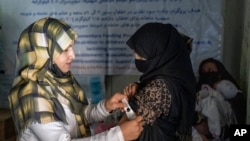Taliban officials in Afghanistan have informed the United Nations they are banning women from working for the organization in Afghanistan, the U.N. said Tuesday about the group’s latest edict restricting the rights and movements of women in that country.
“For the [U.N.] secretary-general [Antonio Guterres], any such ban would be unacceptable and frankly inconceivable,” U.N. spokesman Stephane Dujarric told reporters. “This is the latest in a disturbing trend undermining the ability of aid organizations to reach those most in need.”
The U.N. had expressed concern in recent months that this particular ban would come.
In January, Deputy Secretary-General Amina Mohammed went to the Afghan cities of Kabul, Kandahar and Herat with a high-level delegation to speak with Taliban officials about a series of decrees that have eroded the rights of women and girls, particularly on going to school and university and working outside the home.
Some aid groups suspend work
On December 24, 2022, the Taliban banned Afghan women from working with domestic and international aid groups. Some international nongovernmental organizations suspended their work after the decree. The U.N. feared at the time that international organizations would be next, which now appears to be the case.
“We are still looking into how this development would affect our operations in the country, and we are expecting to have more meetings with the de facto authorities tomorrow in Kabul to seek more clarity,” Dujarric said.
An initial statement from the U.N. Assistance Mission in Afghanistan, known by its acronym UNAMA, expressed “serious concern that female national U.N. staff members have been prevented from reporting to work in Nangarhar province.”
Dujarric said the organization had not been notified in writing of the ban but was told “through various conduits” that the edict applies to Afghan women working for the U.N. across the country, not just in Nangarhar province. As of Tuesday, UNAMA told him that Afghan female staff members were still continuing to work in other parts of Afghanistan. It was not clear when the ban would go into effect across the country.
There was no immediate public comment from the Taliban on the move.
Female staff critical to UN, say officials
Both UNAMA and Dujarric were explicit in stating the critical value of female staff to the smooth continuation of U.N. operations on the ground.
“Obviously, given the society and culture, you need women to deliver aid to women,” Dujarric told reporters, adding that the U.N. is engaging the de facto authorities.
The World Food Program estimates that nearly 20 million Afghans are acutely food-insecure, including more than 6 million people on the brink of famine-like conditions.
The U.N. has nearly 4,000 staff members in Afghanistan, of which about 3,300 are Afghan nationals. Among them are about 400 Afghan women and 200 international female staffers.




